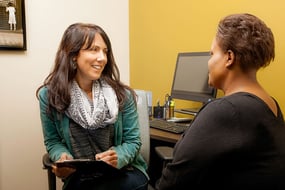We recently sat down with Dr. Phyllis Gilmore, Lead Provider at Hoffman North Clinic in Portland, OR, to discuss why she chose to work in medicine and what led her to Vera. You won't want to miss her remarkable story.
![]() Question #1: Thinking back to when you were making decisions about your career pursuit, what were some of the driving factors leading you towards medicine?
Question #1: Thinking back to when you were making decisions about your career pursuit, what were some of the driving factors leading you towards medicine?
Dr. Gilmore: Well, I didn't start off intending to become a doctor. I went to college to become a zoology teacher. When I was a junior, I was studying comparative anatomy. Come to find out, I had the highest grades in the class—made up of primarily pre-med students.
My teacher pulled me aside and encouraged me to consider medicine. My family didn't have any money. In fact, I was the first person in my family to attend college. And when I shared that with my teacher, he continued to encourage me to think about it more and explore scholarship opportunities.
I'm an only child, but had a friend who was more or less my adopted brother. He'd been so helpful getting me into college already. And he believed if I really wanted to go into medicine, there were ways to make it happen.
I just didn't think I had anything to lose. So I thought I'll do the paperwork, complete the curriculum, and then apply to medical school. If I get in, and the funding to help me, then I'll know it's what I'm supposed to do. If I don't...then I'll be happy being a teacher.
I applied to three medical schools, got accepted to all three and scholarships from two. That was 42 years ago.
![]() Question #2: That's an amazing story. And now, all these years later, what do you love most about practicing medicine?
Question #2: That's an amazing story. And now, all these years later, what do you love most about practicing medicine?
Dr. Gilmore: The interaction with my patients. I like getting to know them, understanding the problem they may be facing, and helping to find a solution.
I've always just been a real people person. And I consider it an honor how people automatically invite us—providers—into the very depths of their lives. It's the guessing game that's kept me in primary care. Because I like looking at symptoms in order to figure out what's wrong. That's a lot of fun.
![]() Question #3: What are some frustrating aspects of your experience in practicing medicine that led you to look for a new career opportunity?
Question #3: What are some frustrating aspects of your experience in practicing medicine that led you to look for a new career opportunity?
Dr. Gilmore: When it became all about the business. I've been practicing long enough that I think I have some right to make a comparison. It used to be that a doctor had their office and they had a secretary, and we used to make good money and all this. But you ran your own shop and you interacted with your patients. Yes, you made money, you had to send out bills, and you helped patients with their insurance. But that wasn't the biggest part.
Through the years, it's changed to where the business aspect, the insurance aspect, the fees, the codes, the hiring a special person in your office just to understand how to do the billing — patients fear going to the doctor because they don't have money. I mean, I've literally been paid in vegetables. Somebody I took care of with a heart attack once gave my boy a pony.
But the business has changed. And I don't see it ever changing back. Most of the places I worked—because they were very rural and remote, and I was the only doctor for about 50 miles—I was worn out. I felt absolute physical and emotional exhaustion. And about two years ago, I was at my breaking point. I needed a change.
![]()
Question #4: What drew you to Vera?
Dr. Gilmore: Most of my career was spent treating really sick people. So for me it was a real breath of fresh air to have an opportunity where I can look at 40-year-olds before they get sick, and I can try to help them keep from getting sick. And I thought maybe that's the change I need that will help me keep going.
To be honest, when Vera told me that the most patients I'd ever have to see is nine people a day, I didn't look back. Not to mention that they added that these people don't pay anything to get their blood test done, and I visit with them once a year for an hour, with a health coach. You can't do preventive care when you're seeing 25 people a day.
![]()
Question #5: What do you love about your job now at Vera?
Dr. Gilmore: It would be better to show you actually. I saw a patient not too long ago who had not seen a doctor in five years. He'd had a diagnosis of a type of cancer 20 years ago, went through extensive surgery, chemo, radiation, and everything. He did fine. I think in his mind, he thought, "Okay, I beat cancer."
Because there was a financial incentive that would lower premiums if he came to Vera for a yearly visit with the lab work, he came in to see us. And it surprised everybody that his blood sugar was sitting at 500. He had no idea he was diabetic or at risk for diabetes.
Going back in his history, he had lost some weight. He had ridden bicycles competitively, and found his endurance was a little bit less. He was very active when we discovered the 500 blood sugar.
We connected him with a coach, who's helping him look at how the impact of this diagnosis hits him psychologically. And he's found a buddy in his bicycle club who also has diabetes. So now they're riding together, doing meal planning together.
It was wonderful that we found this before he got sick. And he's been empowered to take care of himself. Every visit I see him is an hour long, and I see him every two weeks. The lab work he gets is free. The coaching he gets his free. When we first started on medication, I got the medication out of the closet, it was free.
I just recently got a nice thank-you note from him as part of his satisfaction survey. To me that's what I love. And that's what's different about Vera.
Sign up
Join our email list to receive the latest open positions, Vera Careers news, and more.





